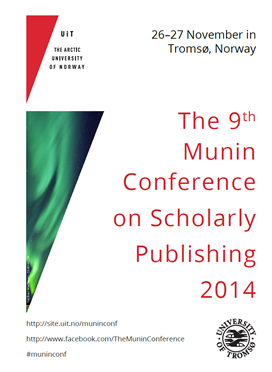IRUS-UK: Improving understanding of the value and impact of institutional repositories
DOI:
https://doi.org/10.7557/5.3238Keywords:
munin conference 2014, Metrics & Altmetrics, Institutional Repository, download statisticsAbstract
>> See video of presentation (21 min.)
Many educational institutions have repositories for research outputs. The number of items available through institutional repositories is growing, and is expected to continue to do so due to requirements for outputs from public-funded research to be open access. But how much usage are institutional repositories and their individual items getting?
Jisc-funded service IRUS-UK is designed to help institutions understand more about the usage of their institutional repositories. It follows on from the successful PIRUS2 project, which demonstrated how COUNTER-compliant article-level usage statistics could be collected and consolidated from publishers and institutional repositories.
IRUS-UK collects raw usage data from participating repositories and processes these into COUNTER-compliant statistics. This provides repositories with comparable, authoritative, standards-based data and opportunities for profiling and benchmarking. It enables institutions to run reports at both repository level (e.g. total download figures) and at item level. IRUS-UK has developed a taxonomy of 25 item types which all items are mapped to so that usage across specific item types (e.g. Article, Book Section) can be consistently compared.
IRUS-UK currently has data from 63 UK institutional repositories, and has recorded over 17 million downloads since July 2012. The data from IRUS-UK can be used to provide information for management reporting, for usage monitoring, and for external reporting (such as annual SCONUL statistics for UK academic libraries). Data can be viewed within the online portal, or downloaded for further analysis.
IRUS-UK recognises that institutional repository usage statistics may not represent total usage, and is investigating ways to combine usage to support institutions in their overall usage statistics. One development is usage figures for electronic theses and dissertations; IRUS-UK has demonstrated the possibility of consolidating usage statistics from institutional repositories and from the British Library’s Electronic Theses Online Service (EThOS) to show total usage.
IRUS-UK is a community-driven development, responding to user needs. User feedback has always been core to the service, and continues to develop with the establishment of a Community Advisory Group. Excellent feedback has been received from users on the ease and speed of set-up, and the value of having consistent, standards-based usage statistics and benchmarking opportunities.
IRUS-UK: http://irus.mimas.ac.uk/
PIRUS2: http://www.cranfieldlibrary.cranfield.ac.uk/pirus2/tiki-index.php









